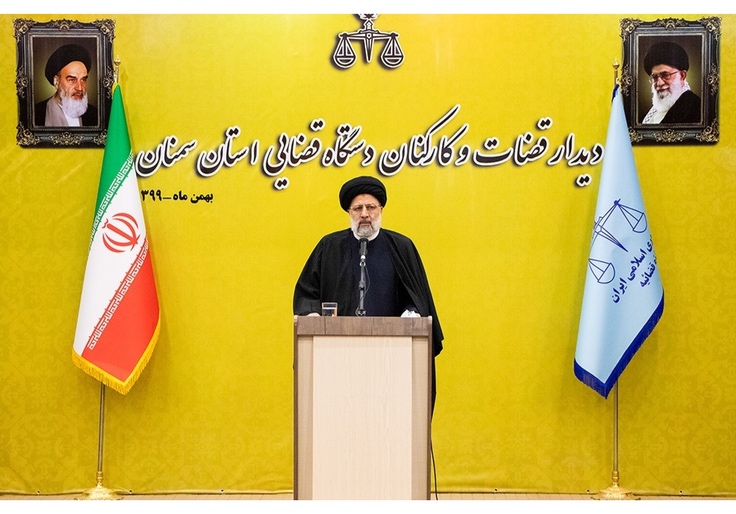Congress is moving to prevent Iran's president from entering the United States to attend U.N. proceedings but is facing resistance from the Biden administration, which says it is "obligated" to allow the hardline president into the country.
Sen. Ted Cruz (R., Texas) is circulating a bill that would bar all officials tied to Iranian supreme leader Ali Khamenei, including President Ebrahim Raisi, from obtaining the U.S. visa necessary to attend a meeting of the United Nations' General Assembly, which is taking place this month in New York City. The bill, an advance copy of which was obtained by the Washington Free Beacon, is expected to be introduced Wednesday afternoon.
The Biden administration has been under intense pressure from Congress and activist groups to deny Raisi a U.S. visa, particularly due to Tehran's active plots to assassinate U.S. officials such as former secretary of state Mike Pompeo and former national security adviser John Bolton. Cruz's bill would formalize efforts in Congress to pressure the administration into barring Raisi amid the assassination plots.
This pressure campaign has failed, however, with the Biden administration claiming it is "obligated" under U.S. law to allow Raisi into the United States. "As host nation of the U.N., the United States is generally obligated under the U.N. Headquarters Agreement to facilitate travel to the U.N. headquarters district by representatives of U.N. member states," a State Department spokesman told the Free Beacon. "We take our obligations under the U.N. Headquarters Agreement seriously."
Cruz's bill—dubbed the Strengthening Entry Visa Enforcement and Restrictions, or SEVER, Act of 2022—would alter the law to facilitate a visa ban on all Iranian officials sanctioned for their ties to Khamenei, the country's hardline leader. The bill is likely to attract bipartisan support in the wake of a letter that more than 50 lawmakers sent earlier this month to the White House. The lawmakers asked the president to "deny entry visas" to Raisi and his delegation. Raisi is already subject to sanctions under a 2019 Trump administration order that targeted the Iranian president for his role in approving the execution of children.
"The United States is absolutely able to deny entry to anyone who threatens our national security," Cruz told the Free Beacon. "Raisi is a mass-murdering terrorist who was handpicked by the ayatollah—and he's coming to the United States while there are Iranian agents trying to murder former American officials and dissidents on American soil. Joe Biden should not grant him a visa, and Congress should pass the SEVER Act to ensure he doesn't do so now or in the future."
U.S. law enables the president to deny visas to foreign officials who engage in "espionage" or pose a direct threat to national security. Raisi could likely be denied a visa for engaging in "terrorist activities," given that he helms the Islamic Republic's regional militant operations. Raisi also gave a speech in January in which he threatened to assassinate Pompeo and former president Donald Trump.
The State Department this year also listed Raisi as a major human rights abuser under the 2012 Iran Threat Reduction and Syria Human Rights Act—a designation that could allow the Biden administration to deny him a visa.
Current law provides the Biden administration with enough leeway to bar Raisi from entering the United States, according to Cruz's office, which says the administration "is deliberately acting in a lawless way to advance its pro-Iran positions."
Cruz spearheaded a 2014 law that added a prohibition on those individuals known to support "terrorist activities," which forced then-president Barack Obama to deny a visa to Hamid Aboutalebi, Iran's U.N. ambassador at the time.
Cruz's latest legislative effort builds on a Trump-era executive order that authorized sanctions on all Iranian officials tied to Khamenei's office. It is one of several executive orders that the Biden administration is expected to cancel as part of its efforts to ink a revamped version of the 2015 nuclear accord, which will give Tehran access to nearly $7 billion in assets on the day it is signed.
Cruz's bill would effectively provide the administration with a new avenue to deny Raisi's visa for his role in Iran's mass human rights abuses, though Biden is not expected to exercise this new authority.
The 52 members of Congress who earlier this month pressed Biden to bar Raisi from U.S. soil also floated an action of this nature.
"The United States cannot overlook Ebrahim Raisi's direct involvement in gross violations of internationally recognized human rights, including the 1988 organized mass murder of thousands of political prisoners, among whom were women and children, by the Iranian regime," the lawmakers wrote. "It is unacceptable that the Iranian government continues to back state-sponsored terrorist activities around the globe, including campaigns to assassinate American officials."
Pompeo, one of the primary targets of Iran's assassination campaign, told the Free Beacon last month that Raisi's role in these plots should disqualify the Iranian president from stepping foot in the United States.
"We worked for four years to deny Iranian terrorists the freedom to put Americans at risk," Pompeo said. "This administration is allowing them to come to New York City while actively engaged in efforts to kill Americans on U.S. soil. The Iranians just recently sponsored an attack that was almost successful in killing an American in that very city. We can do better."
Former ambassador to the United Nations Nikki Haley has made similar demands.
"Under no circumstances should the Biden administration allow Raisi to set foot in our country," Haley told the Free Beacon in August. "He should not be allowed to stain American soil."
